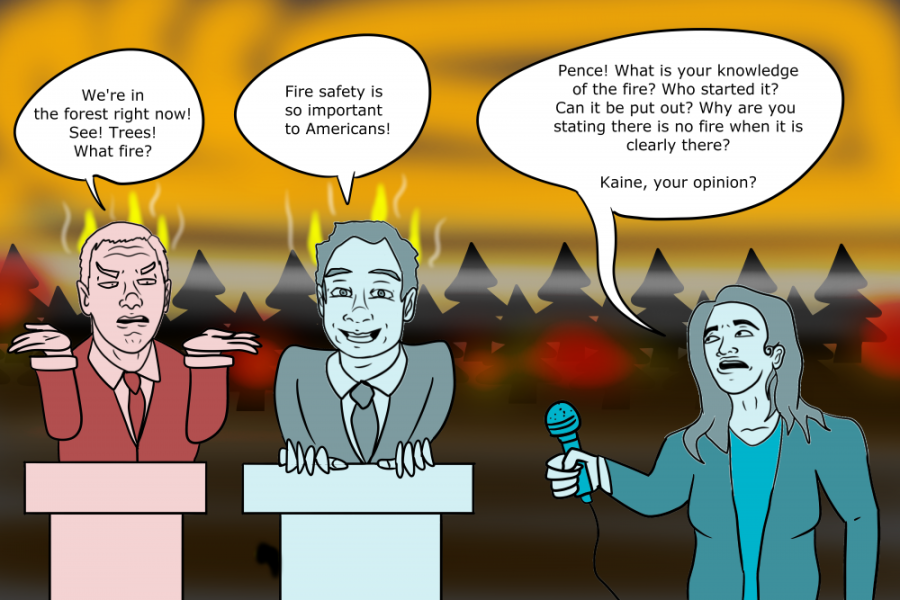“Vice presidential debate changes course of election,” is a headline you’d never see run in a major newspaper. As much as MSNBC would like you to believe otherwise, the debate between Sen. Tim Kaine and Gov. Mike Pence was less a “showdown” than an inconsequential skirmish in a meadow adjacent to the main battlefield.
There are, however, ominous underpinnings to the so-called “battle of the dads.”
It will take the casual political observer about 10 seconds to read 10 different accounts about how Gov. Pence won the debate. There are polls to prove it, too!
Sen. Kaine did not exactly cover himself with glory from a rhetorical standpoint; he interrupted his opponent 60 times and often came off as desperate in the face of Gov. Pence’s Midwestern stoicism, which itself approached caricature at times.
RELATED: Debate takeaways: Hillary steps into her stride
Indiana’s esteemed governor did have his own gaffe almost immediately, referring to host Longwood University as “Norwood University,” which does not exist. To his credit, Pence did spend most of the debate in “silently disapproving dad” mode, against which Kaine’s roiling indignation broke time after time.
This is more or less the media narrative that has coalesced on the night of the debate: The affair was not really important overall, but Kaine was pushy and Pence held his own.
What is mentioned all too infrequently is the extent to which the Republican candidate lied his way through the debate.
As Dylan Matthews mentioned in an excellent piece for Vox, ignoring this fact while evaluating the rhetorical capabilities of each man is, at best, theater criticism.
To be fair, American presidential politics has rarely, if ever, been a sober, data-driven examination of dueling policies. That will not change in the year Donald J. Trump is running for this nation’s highest office.
If anything, this debate should have been a mild distraction from the repulsive neon histrionics of this election cycle. Both vice president candidates have legitimate experience in both national and local politics and, more importantly, are infinitely less interesting than the upper half of their respective tickets.
What the American electorate got instead was a terrible piece of political theater and an excellent example of lying as debate strategy.
When faced with things his candidate did or said, Gov. Pence simply lied.
When Sen. Kaine asked him to defend Mr. Trump’s position that “more nations should get nuclear weapons,” Gov. Pence astoundingly said, “He never said that.”
Mr. Trump, on record and on camera, has said that he would be fine if South Korea, Japan and Saudi Arabia acquired nuclear weapons.
This moment is but a tear in a torrent; after a few feeler exchanges, the two candidates worked out a routine. Sen. Kaine or moderator Elaine Quijano would ask Gov. Pence about a certain Trumpism; Pence would lie or flat-out ignore the question; Sen. Kaine would protest impotently. Rinse and repeat for 90 minutes.
Lying does seem like a wildfire in the age of communication: You can control the way you contain or extinguish the flame, but it is difficult to stand in front of a burning forest and say, “My, how the trees are growing today.”
Yet here Mike Pence stands, shoulders squared, amid the smoke and ashy detritus spewed forth from the bilious depths of the Trump campaign, talking calmly about green leaves and growth rates.
RELATED: Pepe in politics: How to be a bigot according to Hillary
Pence has been praised by some in the GOP for being a “principled Republican,” but principles of any kind were scarce at Longwood University on Tuesday night.
Perhaps Gov. Pence knows his function all too well. By the dint of his jawbone, by the virtue of his uncontroversial coiffure, he is an acceptable vessel for the least acceptable aspects of the Republican ticket. The flip-flopping and straight-up lying just sounds better coming from the statesman-like Indianan.
Or, perhaps, Gov. Pence has grander ambitions. Failed vice presidential candidates in recent years have been a mixed bag. Republican Paul Ryan has since gone on to become the most powerful Republican in the country, while Sarah Palin has become a punchline, albeit a very rich punchline.
In any case, Mr. Trump’s running mate, co-conspirator and hostage looked like a president. If American politics has indeed become hostile to facts of any kind, his prospects are bright for 2020—assuming the Clinton-Kaine ticket is successful this year.
Again, it is more likely than not that this debate will be an unpleasant footnote in the annals of presidential campaign history. However, perhaps there is more to it; maybe lying in the face of facts and logic can win you a debate, but only if you do it with a straight face and a reasonable haircut.
Follow Raad Zaghloul on Twitter.









